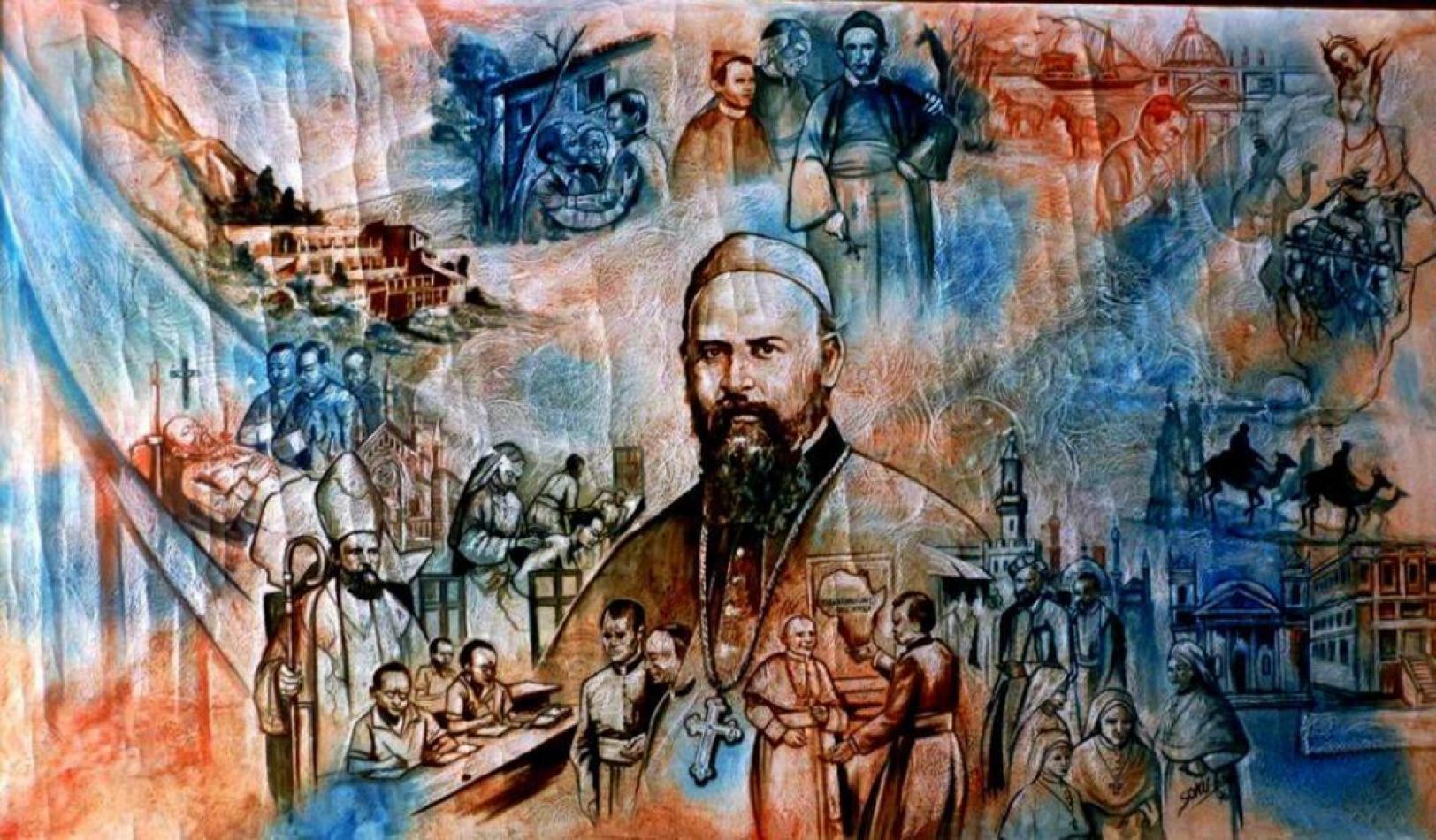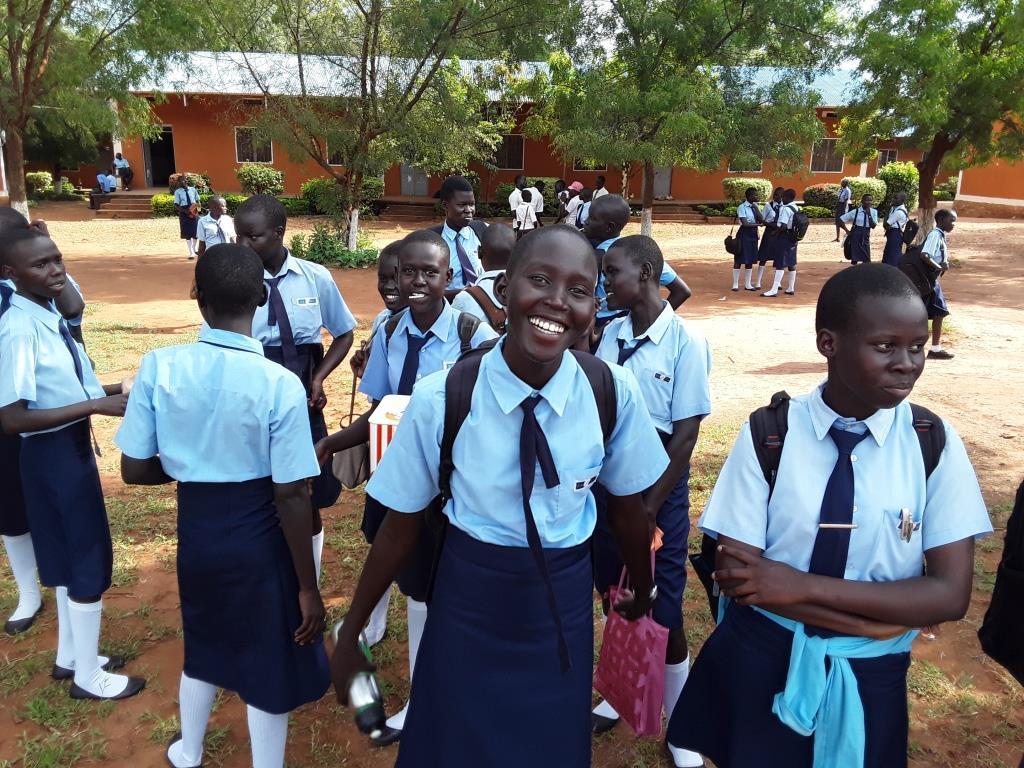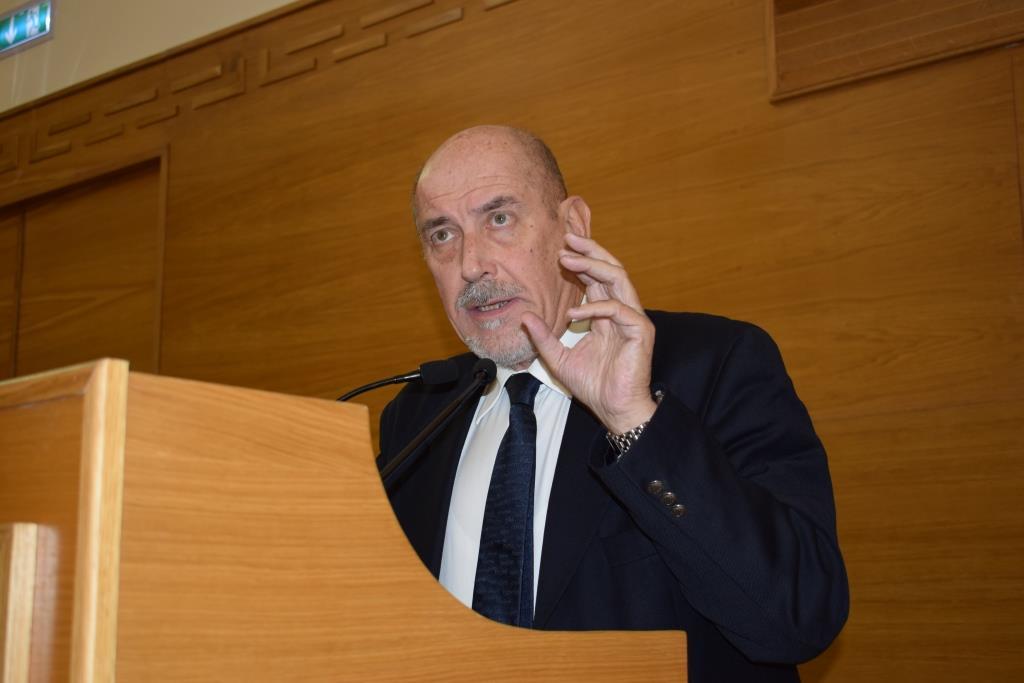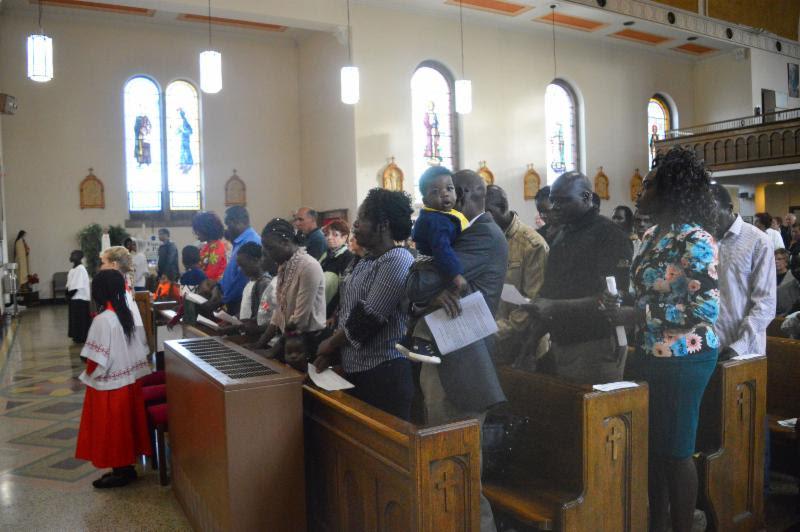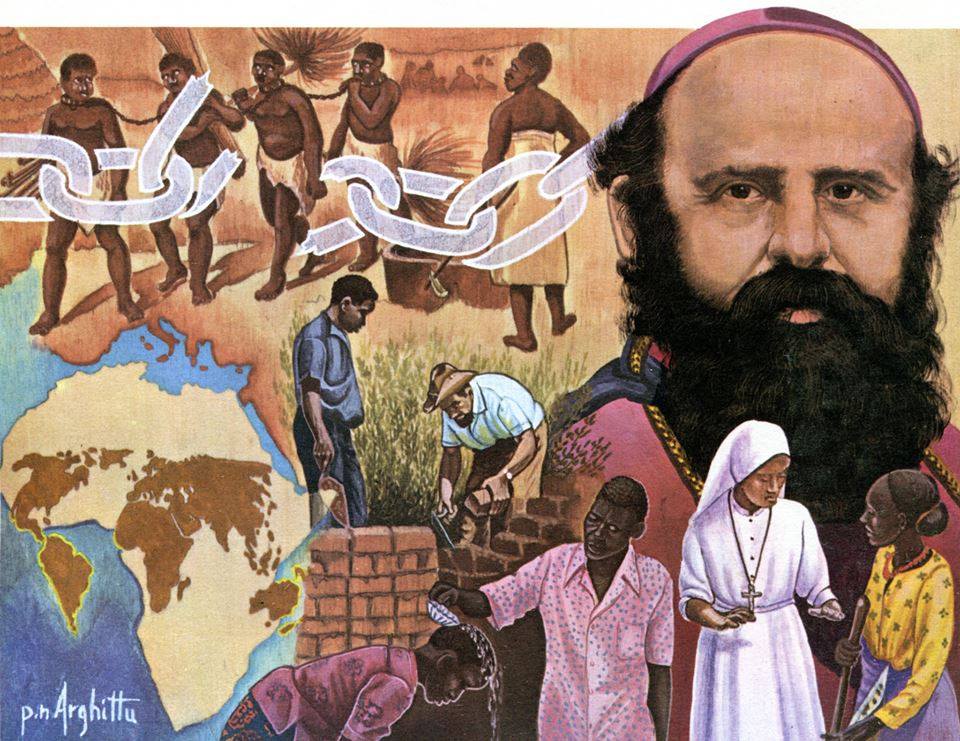Daniel Comboni
Comboni Missionare
Institutioneller Bereich
Andere Links
Newsletter
Thursday, October 17, 2024
Father José da Silva Vieira, a Comboni Missionary working in Ethiopia, reflects in this text on the Comboni Missionary Family, starting from the heart of Comboni who, he emphasises, “is part of our name, because he is our father and our common heritage; he is the GPS for our being mission; we walk on his footsteps”. A reflection which, as he himself tells us, aims to “find the genetic code of our Combonian spirituality and of the way of being mission”, based on three assertions: mission is an alliance; mission is permanent; and mission is networking.
MISSIONARIES AFTER COMBONI’S HEART
The XIX MCCJ General Chapter members wrote in the Chapter Acts 2022 (CA ’22) introduction to the priority of spirituality: “Rooted in Christ, together with St. Daniel Comboni, we live in constant contact with the Lord in prayer which becomes life and mission, spurs all our work and our priorities, humanizes our relationships, motivates our action and renders it fruitful” (CA ’22, 11).
We live in Christ, together with St. Daniel Comboni, and transform prayer into the live-giving sap that empowers us to live the mission we are and our own personal relationships in a fruitful manner.
The Chapter members added: “We dream of a spirituality that enables us to continue to grow as a fraternal family of consecrated persons rooted in Jesus, in his Word and in his Heart, and to contemplate him in the faces of the poor and in the experience lived by St. Daniel Comboni to be the mission” (CA ’22, 12).
This dream did make a huge impression on me since the first time I read the Chapter Acts. It spells out the key ingredients that make our spiritual life: Jesus, whom Charles de Foucault called “my brother and Lord”, his Word, his Heart, the poor and Comboni’s experience.
In today’s reflection I will delve “in the experience lived by St. Daniel Comboni to be the mission” at the light of his inspiring homily in Khartoum, Sudan, when he returned to that Church as Pro-vicar Apostolic.
Our missionary family is made of Comboni Missionaries, Comboni Missionary Sisters, Secular Comboni Missionaries and Lay Comboni Missionaries. Comboni is part of our name, because he is our father and our common heritage. He is the GPS for our being mission; we walk on his footsteps.
KHARTOUM HOMILY
Fr Daniel Comboni was appointed Pro-Vicar Apostolic for Central Africa on May 26, 1872. On June 11, the Central African mission was entrusted to his Institute by a decree of Pius IX.
Earlier, on January 1 of that same year, he founded the Institute of Pie Madri della Nigrizia – the Comboni Missionary Sisters – at Montorio, in Verona, and in the same month he started the Annali del Buon Pastore, the seed of so many Comboni magazines and publications in four continents that make the mass media a field for evangelization in the Comboni tradition.
On September 20, 1872, Comboni sailed from Trieste on his sixth journey to Africa. Six days later he was in Cairo. On January 26, 1873, Comboni left Cairo for Khartoum. The expedition includes for the first time some European sisters. On May 4, after 99 days of tough journeying on the Nile and through the desert, the Pro-Vicar is solemnly welcome in Khartoum. One week later, on May 11, he presents his mission project through a homily.
The sermon, delivered in Arabic, was translated by Fr Giovanni Battista Carcereri and published in the Annali del Buon Pastore.
Let us revisit it:
I am truly happy, dearest friends, to be back with you again after so many sad events and so many sighs of affliction. The first love of my youth was for unhappy Africa and, leaving behind all that was dearest to me in the world, I came, sixteen years ago, to these lands to offer my work for the relief of their age-old sufferings. Subsequently, I was called back home since for health reasons the swamps of the White Nile in the vicinity of the Holy Cross and Gondokoro had reduced apostolic action to impotence. I departed through obedience: but I left my heart in your midst and, when I recovered, as God willed, my concerns and activities were always focused on you.
Today, at last taking back my heart by returning among you, I open it up in your presence with the sublime and religious sentiment of the spiritual paternity with which God willed me to be vested a year ago now by the supreme Head of the Catholic Church, our Lord Pope Pius IX. Yes, I am now your Father, and you are my children and as such, for the first time I embrace you and press you to my heart. I am most grateful for all the enthusiastic welcomes you have shown me; they demonstrate your filial love and have persuaded me that you will always want to be my joy and my crown, just as you are my lot and my legacy.
Rest assured that my soul responds to this with unlimited love forever and for each one of you. I have returned among you never again to cease being yours and all consecrated for your greater good in eternity. Come day come night, come sun come rain, I shall always be equally ready to serve your spiritual needs: the rich and the poor, the healthy and the sick, the young and the old, the masters and the servants will always have equal access to my heart. Your good will be mine and your sorrows will also be mine.
I make common cause with each one of you, and the happiest day in my life will be the one on which I will be able to give my life for you. – I am not unaware of the weight of the burden I have to carry, since as shepherd, teacher and doctor to your souls I shall have to watch over you, educate you and correct you: defend the oppressed without hurting the oppressors, reproach errors without antagonizing those who err, denounce scandals and sins without ceasing to show compassion to sinners, seek out the corrupt without weakening to vice; in a word, be a father and a judge at the same time. But I am resigned to this in the hope that you will all help me to carry this burden with happiness and joy in the name of God.
Yes, I trust primarily in your work, Reverend Father and dearest Vicar General: you who were the first to help me in this work of the Mission for the Regeneration of Africa, the first to raise the banner of the holy Cross in Kordofan and who taught these peoples the first elements of faith and civilisation. And I also trust in you priests, brothers and sons in this Apostolate, for you will be my arms of action to guide the Lord’s people along His path, as well as being my angels of counsel. And I also very much trust in you, venerable Sisters, who with a thousand sacrifices joined me to help in the education of young girls. And I also trust in you, Gentlemen, who will always comfort me by your obedience and compliance to the loving suggestions that my duty and your good will lead me to give you.
As for you, the illustrious representative of His Imperial Majesty and Royal Highness Emperor Franz Josef I, the noble protector of this vast Mission, while I have pleasure in thanking you for all you have done for it so far, I hasten to express the hope that you will gloriously continue to wield the sword in the service of the cross, defending the rights of our divine religion whenever it is ignored or outraged.
And now finally, I turn to you, O merciful Queen of Africa, and appealing once again to you, loving Mother of this Vicariate Apostolic of Central Africa which is entrusted to my care, I make bold to implore you solemnly to receive under your protection myself and my children and to guard us from evil and lead us to good.
O Mary, Mother of God, the great people of Africa sleeps for the most part in the darkness and shadow of death; hasten the hour of their salvation, remove the obstacles, disperse their enemies, prepare their hearts and always send new apostles to these remote lands which are so unhappy and in need.
My children, on this solemn day I commit you to the devotion of the Sacred Hearts of Jesus and Mary, and as I offer for you the most acceptable of sacrifices to Almighty God, I humbly entreat him to pour the blood of redemption over your souls, to regenerate them, to heal them and refine them in accordance with your needs, that this holy Mission may bring you the fruits of salvation, and to God glory. Amen. (Writings 3156-3164).
This homily was proclaimed 151 years ago. It has 899 words in the English translation. It is short, but it is very motivational. It continues to inspire Comboni’s missionaries, female and male. It is part and parcel of our missionary heritage. In it, we find the genetic code of our Combonian spirituality and of the way of being mission.
MISSION IN THREE THEMES
From Comboni’s homily I would like to reflect with you in three takes:
- Mission is an alliance.
- Mission is permanent.
- Mission is networking.
1. MISSION IS AN ALLIANCE
Mission, at Comboni’s light, is a spousal and martyrial alliance with God, with his missionaries and with the people he lives with and ministers to.
Comboni pronounces very strong and deep declarations in his homily. I underline seven:
- The first love of my youth was for unhappy Africa;
- I left my heart in your midst and, when I recovered, as God willed, my concerns and activities were always focused on you;
- For the first time I embrace you and press you to my heart;
- You will always want to be my joy and my crown, just as you are my lot and my legacy;
- I have returned among you never again to cease being yours and all consecrated for your greater good in eternity;
- Your good will be mine and your sorrows will also be mine;
- I make common cause with each one of you, and the happiest day in my life will be the one on which I will be able to give my life for you.
These catchphrases remind me of Ruth’s declaration of belonging to Naomi, her mother-in-law: “Wherever you go, I shall go, wherever you live, I shall live. Your people will be my people, and your God will be my God” (Ruth 1:16).
This is bridal belonging; this is the heart of Comboni’s covenant with the Africans. This should be our own alliance with the people we live with and minister to. Pope Francis wrote in his first apostolic exhortation, the programme for his papacy, that “mission is at once a passion for Jesus and a passion for his people” (Evangelii gaudium, 268). We cannot separate Jesus from his people. They are one.
This spousal alliance blossoms out from the heart: Comboni uses the word heart(s) six times in his homily. It is a cordial covenant springing from love: the word appears three times in the homily. I feel his heart bit on it. While in Italy politicians were proclaiming Roma o morte – Africa or death – from the safety of their comfort zones, Comboni in Africa was saying with his life Nigrizia o morte – Africa or death! He was challenging death with his living. He died in Khartoum 143 years ago at 50. His death is the seal of his love for the Africans.
Paul tells us in that most beautiful hymn to love that “though I shall give away to the poor all that possess, and even give up my body to be burned – if I am without love, it will do me no good whatever” (1 Corinthians 13:3). A mission without love is pretty useless!
Cardinal José Tolentino Mendonça, a Portuguese poet, mystic and master of spirituality, wrote that “there is no love if there is no excess of love”.
To enter into this cordial relationship with the GUJI, our people, we have to say with our life: your language is my language, your culture is my culture, your notion of time is mine, too; your dreams are my dreams, your joys are my joys, your troubles are my troubles, your hopes are my hopes; and my life is yours.
This is the way we exercise the sense of belonging to the people we serve. They may call us farenji (foreigner), but, in fact, we are Guji farenji! When some people express their surprise because I somehow speak Guji, I tell them: “I am Guji but when I was born, I was washed with bleach and my skin got spoiled!” And we have a good laugh together.
On the other hand, each vocation is a personal and unique call. However, we are called to live our own calling in a communion of vocations: our Institutes. In order to live our spousal alliance with the Guji we need to spice our lives with a good pinch of Ubuntu, the African philosophy of life that states that “I am because we are”. We are not lonely agents of evangelization. We have to reclaim “the spiritual joy of being a people” as Pope Francis puts it. He dedicates a whole chapter to this theme in Evangelii gaudium.
Comboni proclaimed: “The happiest day in my life will be the one on which I will be able to give my life for you”. This is the martyrial dimension of mission: to give one’s life for the people she or he serves. Second by second, day by day, year by year.
The Church recognizes two types of martyrdom: red and white. Those who are killed because of hatred of faith and those who have a slow death due to their daily constancy.
Red martyrdom is the easiest one and catches more attention. However, we are invited to give our life, to live day by day with the people we serve at the centre of our hearts. To allow them to dictate our daily agenda. To meet with a smile our daily difficulties. To stay put even when others ran away. This is white martyrdom. It is not eye catching and can be very painful. Nonetheless, this was Comboni’s way of being mission in Central Africa.
2. MISSION IS PERMANENT
Comboni said: “Come day come night, come sun come rain, I shall always be equally ready to serve your spiritual needs: the rich and the poor, the healthy and the sick, the young and the old, the masters and the servants will always have equal access to my heart”.
We are always in a permanent state of mission! “Night and day”. We are all weather missionaries. “Come sun come rain”. We are cordial missionaries for all: “will always have equal access to my heart”. The ones we love or like and the ones we, somehow, do not.
Mission is neither a parttime nor a pastime. It is our breathing, our living, our dying. Missionary service is not just one among many things we do. It is not another parenthesis in our daily personal schedules.
It is a constant readiness to love: “I shall always be equally ready to serve” – Comboni says. “Always!”, he underlines.
It is cordial: it springs from the heart of the blessed Trinity and it is directed to the hearts of the whole world through our own hearts. It is missio Dei (as Ad gentes puts it), not my mission, not the mission of my institute.
Pope Francis wrote in his first apostolic exhortation: “I am a mission on this earth; that is the reason why I am here in this world. We have to regard ourselves as sealed, even branded, by this mission of bringing light, blessing, enlivening, raising up, healing and freeing” ((Evangeliin faudium 273).
Mission is ontological: it is part of my being, of my living, of my identity. We are missionaries because we love the people we live with, always. We do not do mission – some confreres would say “Fare il missionario!”, we are a mission. Always and everywhere!
We are a mission to enlighten, bless, revitalize, raise up, heal and free. What a job description! These are the verbs with which we conjugate mission, its grammar.
Francis introduces his statement with these words: “My mission of being in the heart of the people is not just a part of my life or a badge I can take off; it is not an ‘extra’ or just another moment in life. Instead, it is something I cannot uproot from my being without destroying my very self”.
The ad gentes is not territorial: it is cordial. The heart if the mission’s own territory. It becomes a meeting of hearts: the heart of God with the heart of his people through a missionary heart. We are missionaries by being in the heart of people permanently and wholly, for carrying them always in our hearts.
“All around us we begin to see nurses with soul, teachers with soul, politicians with soul, people who have chosen deep down to be with others and for others. But once we separate our work from our private lives, everything turns grey and we will always be seeking recognition or asserting our needs. We stop being a people” – the pope concludes that paragraph.
So, we are also challenged to be missionaries with a soul, “people who have chosen deep down to be with others and for others”, always, without grey areas of privacy that conditions our option to be for the others.
3. MISSION IN NETWORKING
Comboni, in his programmatic homily, proclaims that he counts – he says “I trust” – on the work of his Vicar General, of his priests and brothers, of the venerable Sisters, of the gentlemen present and of the Austrian emperor’s representative.
In other words, Daniel Comboni knows that the success of his mission as Pro-vicar Apostolic for Central Africa depends on the co-operation of his ecclesial collaborators, of the civil society – the gentlemen – and of the political power – the emperor’s representative – who, in his own words, “will gloriously continue to wield the sword in the service of the cross, defending the rights of our divine religion whenever it is ignored or outraged”.
We are not missionaries in the singular nor can we be missionaries on our own. Jesus sent the Twelve and the Seventy-two two by two. We need to network with other people – local church to which we belong, lay missionaries, civil society, humanitarian agents, religious leaders and members of other churches, politicians, etc. – in order to be the mission God wants us to be.
Chapter Acts 2022, on the priority Ministeriality at the service of requalification, expresses the commitment to “initiate dialogue and collaboration with the local Churches to develop specific and contextualized pastorals and to network with popular movements” (CA ’22, 31.4)
Today, like yesterday and yesteryear, mission is synodal: we walk together, we work together, we live together, we believe together.
Comboni’s plan was a dream of networking of all missionary institutes working together, a broad coalition to prepare the Africans to be the saviours and regenerators of themselves. Unfortunately, this grand project did not work.
Comboni complained about “that cursed egoism of monks and friars which dominates nearly all religious Orders: ‘The Order, then Christ and the Church’. […] The great good that is done is no great thing, says the friar, if it does not come from the Order” (Writings 2387). For this reason, we are here: because other institutes did not work with Comboni he founded his two institutes to carry out the plan. We are a monument to this incapacity to think beyond one’s own order, of networking for God’s glory.
Nowadays, reality is so complex that we are not able to face it on our own be it evangelization, education, sanitation, assistance… We need to pool our ideas, resources and strengths together in order to be effective transformers of society. We need the expertise and the strength of one another in order to be effective in services delivery.
APPEAL TO MOTHER
Comboni calls Mother Mary “the missionary’s precious comfort” (Writings 262). He could not leave her out of his mission statement, of his pastoral programme: he appeals to her at the end of his homily.
He prays:
And now finally, I turn to you, O merciful Queen of Africa, and appealing once again to you, loving Mother of this Vicariate Apostolic of Central Africa which is entrusted to my care, I make bold to implore you solemnly to receive under your protection myself and my children and to guard us from evil and lead us to good.
O Mary, Mother of God, the great people of Africa sleeps for the most part in the darkness and shadow of death; hasten the hour of their salvation, remove the obstacles, disperse their enemies, prepare their hearts and always send new apostles to these remote lands which are so unhappy and in need.
This is our prayer too today and always. Amen!
Qillenso, October 10, 2024 – 143th anniversary of St Daniel Comboni’s dies natalis.
Fr. José da Silva Vieira, mccj
Jirenna

